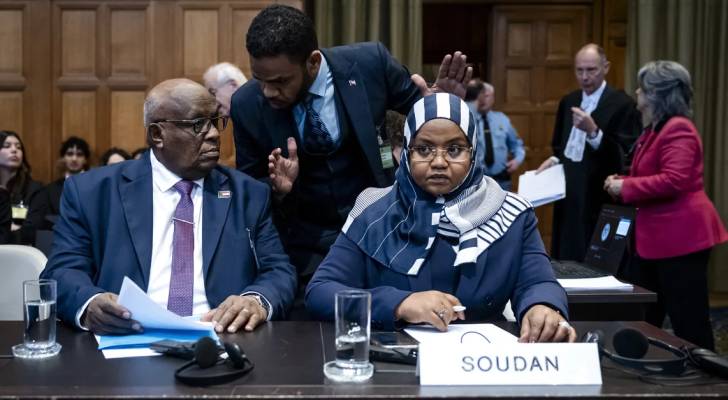Sudan’s acting justice minister Muawia Osman and ambassador Omaima Alsharief attend ICJ hearing in The Hague on April, 10. 2025.
Sudan takes UAE to court in Hague for alleged ‘support, complicity’ in genocide
Sudan has formally accused the United Arab Emirates (UAE) of violating international law by allegedly supporting paramilitary forces involved in ethnic violence in its Darfur region, during a hearing at the International Court of Justice (ICJ) on Thursday.
Speaking before the UN's highest judicial body, Sudan’s acting Justice Minister Muawia Osman said a genocide is underway against the Masalit ethnic group in western Sudan, and alleged that the UAE has played a role in enabling the violence through its alleged support for the Rapid Support Forces (RSF), a paramilitary group engaged in the country’s civil war.
“A genocide is being committed against the ethnic group of the Masalit in the west of our country,” Osman told the court. He added that this was being carried out “with the support and complicity of the United Arab Emirates.”
Sudan filed the case last month under the Genocide Convention, accusing the UAE of arming the RSF and contributing to atrocities committed in the Darfur region. The UAE has strongly denied the allegations, calling them “baseless and politically driven.”
Speaking at the court, UAE representative Reem Ketait, Assistant Deputy Minister of Political Affairs, rejected the claims and questioned the ICJ’s jurisdiction. “Our only interest is in securing a lasting peace that ends the suffering of the Sudanese people and brings stability to Sudan and the wider region,” she said in a statement to CNN.
The case comes amid a brutal conflict that erupted in April 2023 between Sudan’s national army, led by General Abdel Fattah al-Burhan, and the RSF, headed by his former deputy Mohamed Hamdan Dagalo. The conflict has triggered one of the world’s worst humanitarian crises, displacing millions and pushing nearly half of the country’s population into severe hunger.
Both Sudan and the UAE are parties to the 1948 Genocide Convention, which prohibits acts committed with the intent to destroy, in whole or in part, a national, ethnic, racial, or religious group. Sudan has asked the ICJ to impose emergency measures requiring the UAE to cease any conduct that could constitute complicity in genocide and to submit regular reports to the court.
The UAE, in response, has accused Sudan of misusing the court as a platform for political messaging. “This is nothing more than a cynical PR stunt,” Ketait said, accusing Sudan’s army of attempting to deflect attention from its own actions in the conflict.
International reactions have been mixed. In January, the United States officially recognized attacks against the Masalit as genocide. A UN panel last year found “credible” evidence of foreign involvement in the conflict, including the UAE and Chad. U.S. lawmakers have since called for a halt to arms sales to the UAE pending further investigation.
Sudan’s legal team referenced intelligence documents claiming that weapons supplied by the UAE to the RSF are being routed through neighboring Chad. They argued that these ongoing arms transfers constitute continued support for forces accused of mass killings, sexual violence, forced displacement, and destruction of property.
As the ICJ proceedings begin, the humanitarian toll in Sudan continues to mount. According to the World Food Programme, about 25 million people — over half the population — are in urgent need of aid. Famine has already been declared in parts of the south and west, and is projected to spread unless the violence subsides and humanitarian access improves.
“This is a man-made crisis,” said Shaun Hughes, the World Food Programme’s Regional Emergency Coordinator, at a Thursday briefing. “And man-made because of the intentional obstruction of the delivery of humanitarian assistance by parties to the conflict.”
Humanitarian organizations warn that recent funding cuts threaten to worsen the situation. Mercy Corps, which provides critical support in Sudan, says reductions in USAID funding could leave nearly 200,000 people without food or clean water.
As Sudan’s case progresses through the ICJ — a process that could take years — observers say the proceedings underscore growing international scrutiny of external actors involved in the country’s conflict. For now, civilians in Sudan remain caught in a worsening crisis with no clear end in sight.




